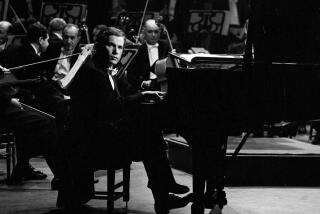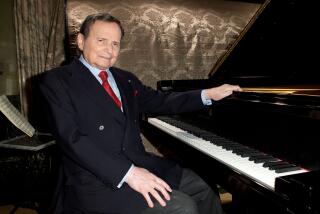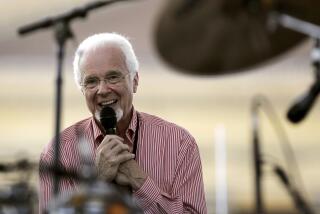Earl Wild dies at 94; ‘the last of the great Romantic pianists’
- Share via
Earl Wild, the elder statesman of American piano virtuosos who was often called “the last of the great Romantic pianists,” died Saturday at his home in Palm Springs. He was 94.
He died of congestive heart failure after a long illness, his companion, Michael Rolland Davis, said on Wild’s website.
Wild had to be “the world’s only pianist to have composed for Sid Caesar, toured with Eleanor Roosevelt and been ranked in dexterity with Vladimir Horowitz,” the Washington Post pointed out in 1986.
Stewart Gordon, a longtime professor of keyboard studies at USC, called Wild “a magnificent pianist” who “combined his art with great personal charm and wit.”
These traits helped sustain him “as an international ambassador, playing and teaching with equal ease at multiple levels, from being a favorite of European royalty to offering words of wisdom to aspiring young musicians,” Gordon said in an e-mail to The Times.
Wild continued giving lessons until last week and gave his last public performance at 92 at the Walt Disney Concert Hall, the Associated Press reported.
He was born Nov. 26, 1915, in Pittsburgh, and by age 6 his fluid piano technique was already “a source of wonder,” Time magazine said in 1995.
As a teen, he was a concert-hall veteran and studied with the distinguished Dutch pianist Egon Petri. After attending what is now Carnegie Mellon University, Wild joined Arturo Toscanini’s NBC Symphony Orchestra in 1937.
Two years later, Wild gave the first piano recital on television. He first experienced fame after Toscanini asked him to play piano for a 1942 radio broadcast of Gershwin’s “Rhapsody in Blue.”
He also became pigeonholed as a specialist in the pops repertory, particularly Gershwin, and in the works of Franz Liszt, even though his musical arsenal was vast.
An immaculate technician, Wild made more than 100 recordings “of the widest possible piano repertory,” which reflected “not only lofty technical standards but a striking musical sophistication,” Daniel Cariaga, then a music critic for The Times, wrote in 2005.
Many pianists consider Wild’s recordings for Reader’s Digest of the four Rachmaninoff concertos to be “the quintessential, definitive performance of those works,” Gordon told The Times in 2005.
When Wild wasn’t playing flute in the Navy band during World War II, he often traveled with then-First Lady Eleanor Roosevelt to perform the national anthem before her speeches.
He also played piano for six consecutive presidents, from Herbert Hoover to Lyndon B. Johnson.
After the war, he joined ABC as a staff pianist, conductor and composer until 1968. His own compositions included the Easter oratorio “Revelations,” first broadcast on ABC in 1962, and many piano transcriptions.
In the 1950s, he wrote musical parodies for Caesar’s NBC show after the comedian sought help spoofing operas.
Certain “elitist quarters” never forgave Wild his early work in radio and TV, “his nonintellectual approach to music and his refreshingly nonchalant virtuosity,” the New York Times reported in 2005.
By the 1950s, Wild had a well-established concert career and went on to play with many U.S. orchestras. He also taught piano at Juilliard in the 1970s and early 1980s.
He won a Grammy Award in 1997 for his disc “The Romantic Master,” which included works by Saint-Saens and Handel.
In 2005, Wild marked his 90th birthday with a boisterous recital at Carnegie Hall given months after his quadruple-bypass surgery.
Even a decade ago, Wild often practiced eight hours a day but didn’t consider it practice. “It’s more like breathing,” he once said.
Davis, his companion of 38 years, is his only survivor.
More to Read
The biggest entertainment stories
Get our big stories about Hollywood, film, television, music, arts, culture and more right in your inbox as soon as they publish.
You may occasionally receive promotional content from the Los Angeles Times.











